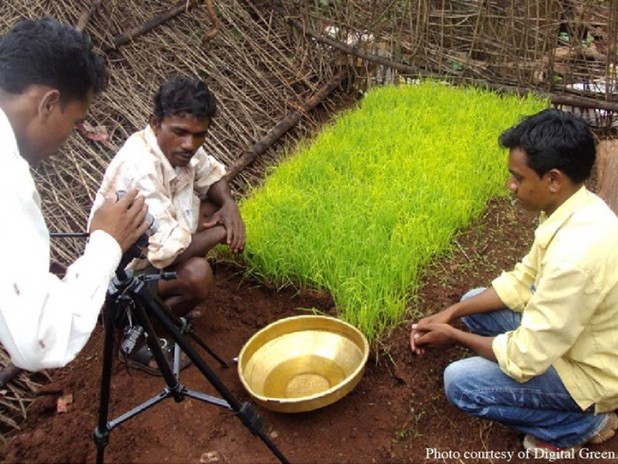September 04, 2013
Danny Alexander and his IDEO.org team head to India, where they are working with Digital Green to find new ways for distributing data to relevant stakeholders in an organization that has created thousands of agricultural training videos in over 20 languages.
IDEO.org is excited to start a new project with Digital Green to improve data dissemination to stakeholders working with rural Indian farmers. Digital Green, a nonprofit based in Delhi, has developed a knowledge platform sharing best practices among farming communities. Through a network of local partners, the organization has created thousands of agricultural training videos in over 20 languages, pertaining to locally relevant agronomic, health, and livelihood practices. Community video production teams are trained by Digital Green and then create videos around 10 minutes in length. These videos are screened in villages across India for small community groups to motivate and educate viewers. A local facilitator then mediates discussion around the video screenings by pausing, rewinding, asking questions, and responding to feedback. Though their video production and distribution methods have proven to be a highly effective and efficient means of disseminating information, Digital Green approached IDEO.org with a design opportunity for making their existing system work even better.
Initially founded from a research project that came out of Microsoft Research India's Technology for Emerging Markets team, Digital Green has a strong foundation of software tools and data collection systems. They collect data on a number of different variables (video showings, farmers’ interest in each topic, implementation rate, etc.) across all of the regions where they work. This data provides a helpful foundation for decision-making at the management level and valuable feedback for donors. However, because this data collection system has been designed for organizational use and only distributed online, the data is currently providing value for only a small number of stakeholders. In each region, for example, a team of producers, subject matter specialists, and facilitators are responsible for creating and screening the agricultural training videos, but the data Digital Green collects is rarely—if ever—made available to them.
Together with Digital Green, IDEO.org is exploring ways to expand the accessibility of the data Digital Green is collecting and find new ways of creating value for all of Digital Green’s stakeholders. Over the next few weeks we’ll be asking: How might we improve performance for all members of the Digital Green team (i.e. Subject Matter Specialists, Producers, and Facilitators) through the capture and communication of meaningful, relevant data?
In addition to the design challenge, an interesting factor playing into this project will be a new design process that our IDEO.org team is testing for the first time. At IDEO.org we’re always looking for ways to become more efficient and more (cost) effective designers. For this reason, we are excited to be testing a new way of structuring projects—with our design team running two projects together in parallel, rather than in series while in India. By combining these projects—both related to agriculture in India—we’ll not only save time and money, but more importantly, we’ll leverage the learnings of both projects to support each other. We’ll keep you updated on how this broader trial period goes in future posts.
The project team for these two projects includes three members of the new IDEO.org Fellowship class -- Martin Schnitzer, an accomplished industrial designer, Rafael Smith, an interaction designer and social entrepreneur, and Mariana Prieto, a product designer. I’m joining the team in my new role as an IDEO.org Senior Designer. We’re moving quickly on both Digital Green and our other project with Arohana, so stay posted for more updates from India in the next week or two!



